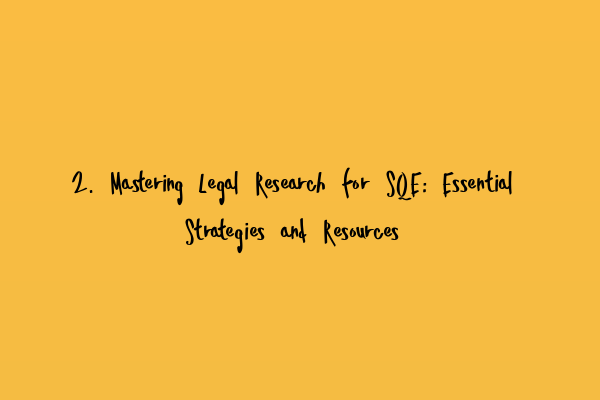Mastering Legal Research for SQE: Essential Strategies and Resources
Welcome to SQE Exam Law, where we provide comprehensive guidance and support for aspiring solicitors navigating the Solicitors Qualifying Examination (SQE). In this article, we will delve into the crucial topic of mastering legal research for SQE and share essential strategies and resources to help you excel in this aspect of the examination.
Legal research is a fundamental skill that every successful solicitor must possess. It involves systematically gathering, analyzing, and interpreting legal information to support legal arguments, provide advice, and effectively represent clients. As the SQE places great emphasis on practical legal skills, mastering legal research is pivotal to your success in the examination and your future legal career.
The Importance of Legal Research in SQE
The SQE is designed to assess your competence in performing tasks that a solicitor is expected to execute on a daily basis. Legal research is one of these tasks, and performing it efficiently and accurately is crucial to achieving a favorable outcome for your clients.
Throughout the SQE, you will encounter various scenarios and case studies that require you to identify relevant legal principles, statutes, case law, and regulations. Strong legal research skills enable you to sift through vast amounts of information, extract pertinent details, and apply them to the specific problem at hand. By mastering legal research, you can better analyze the issues, assess the potential legal consequences, and provide well-grounded advice or arguments.
Essential Strategies for Mastering Legal Research in SQE
To help you excel in legal research, we have compiled a list of essential strategies:
1. Understand the Question
Before diving into the research, make sure you understand the question or problem statement. Identify the key issues, parties involved, and the context of the scenario. This will help you narrow down your research scope and focus on relevant authorities.
Related Article: SQE Case Studies: Applying Knowledge in Real-Life Scenarios
2. Start with Secondary Sources
Secondary sources, such as textbooks, legal guides, and online databases, can provide a solid foundation for your research. They often summarize and analyze primary sources, making them easily digestible and helping you grasp complex legal concepts.
Related Article: Mastering Time Management in SQE: Strategies for Efficient Exam Completion
3. Utilize Online Legal Databases
In today’s digital age, legal research has become more convenient with the availability of online legal databases. Platforms like LexisNexis and Westlaw provide access to an extensive collection of case law, legislation, and legal commentary. Use these resources to find relevant authorities and support your legal arguments.
Related Article: Analyzing Mock Results for SQE: Identifying Areas of Improvement
4. Analyze Relevant Statutes and Case Law
Primary sources, such as statutes and case law, carry significant weight in legal research. When conducting your research, carefully analyze relevant statutes to understand the legal framework that governs the issue. Additionally, delve into case law to identify precedents that may impact your analysis.
5. Cross-Referencing and Verifying Sources
Ensure the accuracy and reliability of your legal research by cross-referencing and verifying the sources you rely on. Check multiple reputable sources to confirm the validity of your findings and strengthen the credibility of your arguments.
6. Take Effective Notes
While conducting legal research, it is essential to take concise and organized notes. This will help you keep track of your findings and facilitate efficient referencing when drafting legal opinions or providing advice to clients.
Resources for Mastering Legal Research in SQE
To enhance your legal research skills, utilize the following resources:
1. Law Libraries
Visit local law libraries or university libraries that offer access to legal resources. These libraries often provide an extensive collection of books, journals, and legal databases that can support your research.
2. Online Legal Research Guides
Several websites offer comprehensive legal research guides designed specifically for solicitors. These guides provide step-by-step instructions, research tips, and recommended resources to help you navigate complex legal issues.
3. SQE-focused Legal Training Providers
Consider enrolling in SQE-focused legal training programs that offer specialized courses on legal research. These providers often have experienced practitioners who can guide you through practical exercises and provide valuable insights.
Related Article: SQE Strategies: Proven Tactics to Ace the Solicitors Qualifying Examination
4. Online Legal Research Tools
Supplement your research with online legal research tools that streamline the process and provide valuable insights. For example, tools like Casetext and Fastcase offer advanced search functions, annotations, and case summaries that can save you time and improve the quality of your research.
Conclusion
Mastering legal research is essential for success in the SQE and beyond. By understanding the importance of legal research, implementing effective strategies, and utilizing valuable resources, you can enhance your skills and increase your chances of achieving favorable outcomes for your clients.
Related Article: Solicitors Qualifying Examination (SQE): Your Gateway to Legal Practice
Remember, SQE Exam Law is here to support you on your journey towards becoming a qualified solicitor. Stay tuned for more articles, tips, and strategies to help you excel in the Solicitors Qualifying Examination!
